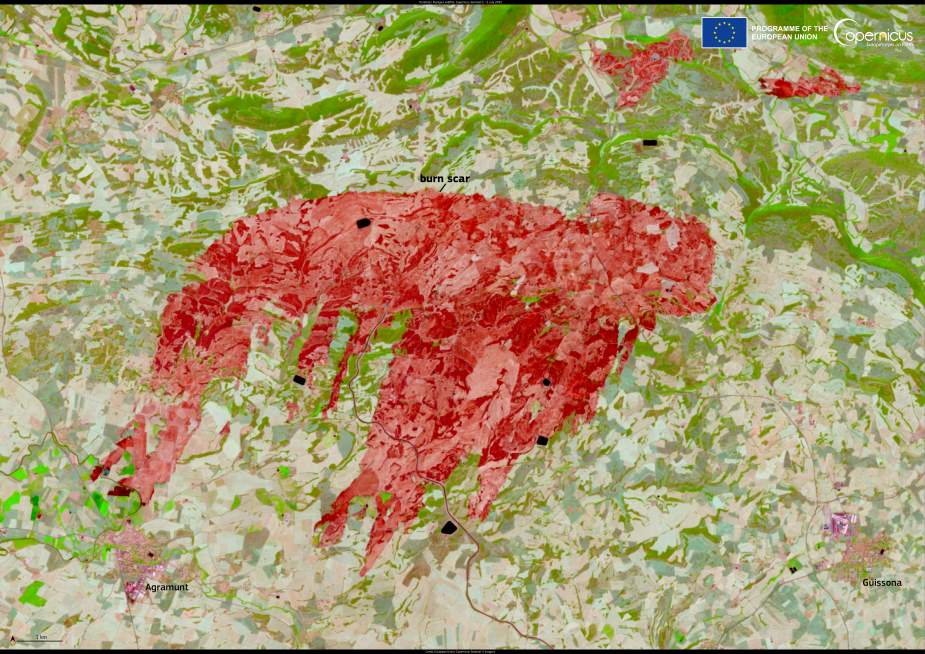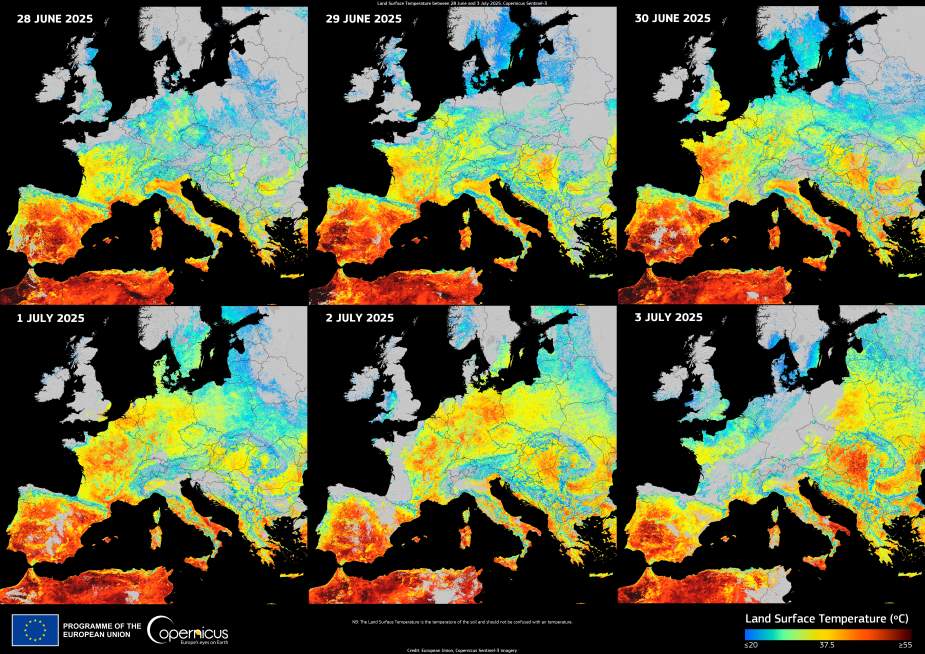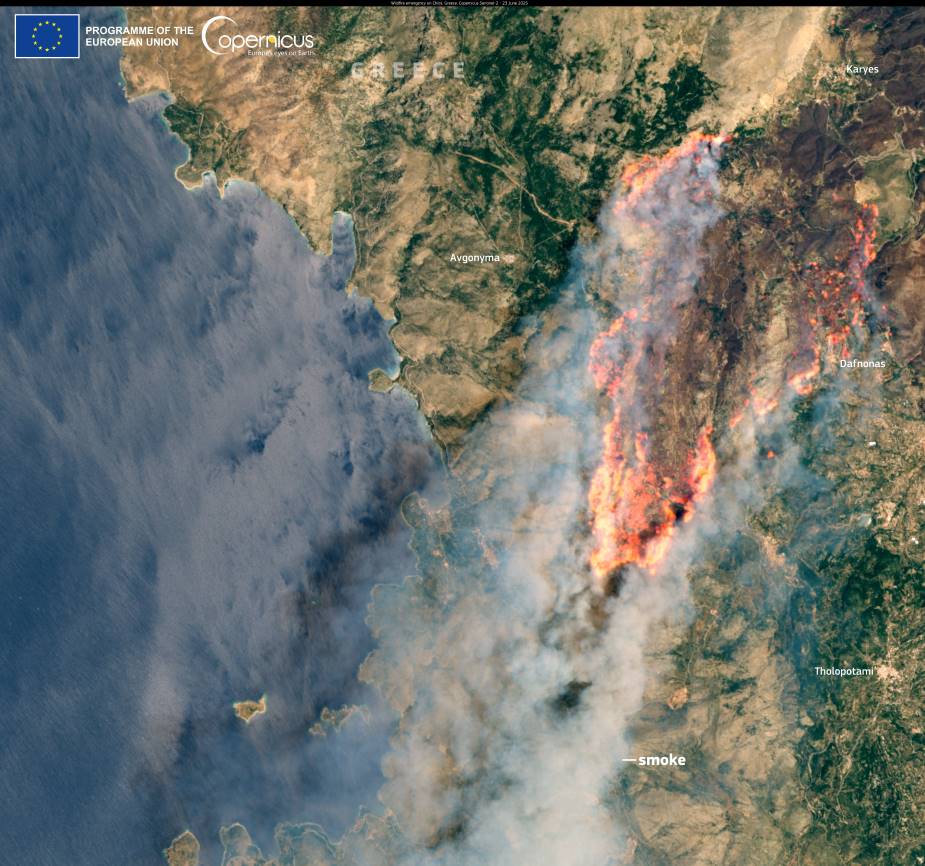
Image of the day: Wildfire scars in Segarra, CataloniaNews Muser NewsDeskJuly 5, 2025
Full article
Muser NewsDeskJuly 5, 2025
Full article
Image of the day: Wildfire scars in Segarra, Catalonia
A fast-moving wildfire broke out on 1 July 2025 in the Segarra region of Catalonia, Spain, amid extreme winds and dry conditions. The fire spread…

Texas flood toll rises to 24 as rescuers search for missing childrenNews SourceJuly 5, 2025
Full article
SourceJuly 5, 2025
Full article
Texas flood toll rises to 24 as rescuers search for missing children
Houston, United States | AFP Rescuers were desperately searching for at least 20 girls missing from a riverside summer camp, officials said Friday, after torrential rains…

Image of the day: Scorching land temperatures track Europe’s spreading heatwaveNews Muser NewsDeskJuly 4, 2025
Full article
Muser NewsDeskJuly 4, 2025
Full article
Image of the day: Scorching land temperatures track Europe’s spreading heatwave
An intense heatwave has swept across Europe since late June 2025, with scorching land surface temperatures expanding eastward over the course of a week. The…

Heavy snow hits Turkey’s northeast as southwest burnsNews SourceJuly 4, 2025
Full article
SourceJuly 4, 2025
Full article
Heavy snow hits Turkey’s northeast as southwest burns
Istanbul, Turkey | AFP A rare blanket of heavy snow fell on parts of northeastern Turkey on Friday as the rest of the country sweltered in…

Image of the day: Soil dries out in northern FranceNews Muser NewsDeskJuly 3, 2025
Full article
Muser NewsDeskJuly 3, 2025
Full article
Image of the day: Soil dries out in northern France
As Europe endures a severe heatwave with temperatures topping 40 °C across several countries, northern France is showing signs of growing drought stress. These satellite images,…

Global drought hotspots report catalogs severe suffering, economic damage in 2023-2025News SourceJuly 3, 2025
Full article
SourceJuly 3, 2025
Full article
Global drought hotspots report catalogs severe suffering, economic damage in 2023-2025
Food, water, energy crises, human tragedies in 2023-2025 detailed in sweeping analysis Fuelled by climate change and relentless pressure on land and water resources, some…

Image of the day: Heatwave grips EuropeNews Muser NewsDeskJuly 2, 2025
Full article
Muser NewsDeskJuly 2, 2025
Full article
Image of the day: Heatwave grips Europe
Large swathes of Europe are experiencing extreme heat as a prolonged heatwave sweeps across the continent, bringing record-breaking temperatures, school closures, and rising health risks.…

EU unveils long-delayed 2040 climate target – with wiggle roomNews SourceJuly 2, 2025
Full article
SourceJuly 2, 2025
Full article
EU unveils long-delayed 2040 climate target – with wiggle room
Brussels, Belgium | AFP The EU on Wednesday unveiled its long-delayed target for cutting greenhouse gas emissions by 2040, but with contested new flexibilities built in…

ECDC launches new reports and guidance to track mosquito-borne diseases in EuropeNews SourceJuly 2, 2025
Full article
SourceJuly 2, 2025
Full article
ECDC launches new reports and guidance to track mosquito-borne diseases in Europe
As Europe enters this year’s mosquito season, the European Centre for Disease Prevention and Control (ECDC) has launched a new series of weekly surveillance updates…

Effective therapies needed to halt rise in climate anxietyNews SourceJuly 2, 2025
Full article
SourceJuly 2, 2025
Full article
Effective therapies needed to halt rise in climate anxiety
More must be done to address the growth in anxiety related to climate change, says a leading psychologist, before it becomes the next mental health…

Image of the day: Snow blankets the Atacama DesertNews Muser NewsDeskJuly 1, 2025
Full article
Muser NewsDeskJuly 1, 2025
Full article
Image of the day: Snow blankets the Atacama Desert
Snowfall in the Atacama Desert is so uncommon that when it does occur, it transforms one of Earth’s driest landscapes into an unfamiliar scene. On…

Over 14 million people could die from US foreign aid cuts: studyNews SourceJuly 1, 2025
Full article
SourceJuly 1, 2025
Full article
Over 14 million people could die from US foreign aid cuts: study
Paris, France | AFP | Muser NewsDesk More than 14 million of the world's most vulnerable people, a third of them small children, could die by…

Mediterranean set new June temperature high on Sunday: French weather serviceNews SourceJune 30, 2025
Full article
SourceJune 30, 2025
Full article
Mediterranean set new June temperature high on Sunday: French weather service
Paris, France | AFP The Mediterranean Sea on Sunday hit its warmest temperature on record for June at 26.01 degrees Celsius, said a French weather service…

Image of the day: Fogo’s volcanic heart in Cape VerdeNews Muser NewsDeskJune 30, 2025
Full article
Muser NewsDeskJune 30, 2025
Full article
Image of the day: Fogo’s volcanic heart in Cape Verde
In the southern reaches of the Cape Verde archipelago, the island of Fogo rises from the Atlantic with a stark, volcanic presence. At its core…

Fires break out as southern Europe heatwave intensifiesNews SourceJune 30, 2025
Full article
SourceJune 30, 2025
Full article
Fires break out as southern Europe heatwave intensifies
Rome, Italy | AFP | Muser NewsDesk Firefighters mobilised in several countries to tackle blazes as southern Europeans sought shelter from punishing temperatures of a heatwave…

Image of the day: Reinforced coastal defenses on Tuvalu’s main atollNews Muser NewsDeskJune 29, 2025
Full article
Muser NewsDeskJune 29, 2025
Full article
Image of the day: Reinforced coastal defenses on Tuvalu’s main atoll
The Pacific island nation of Tuvalu is taking visible steps to adapt to the worsening threats of coastal erosion and sea-level rise. In this image,…

Cold baths, climate shelters as Southern Europe heatwave intensifiesClimate SourceJune 29, 2025
Full article
SourceJune 29, 2025
Full article
Cold baths, climate shelters as Southern Europe heatwave intensifies
Rome, Italy | AFP | Muser NewsDesk Authorities across Southern Europe urged people to seek shelter Sunday and protect the most vulnerable as punishing temperatures from…

Urban trees continue cooling cities even during extreme heatwavesScience SourceJune 29, 2025
Full article
SourceJune 29, 2025
Full article
Urban trees continue cooling cities even during extreme heatwaves
Plane trees in cities have an important cooling effect even in extreme heat, according to a new study conducted by the Swiss Federal Institute for…

Image of the day: Farmland and cityscapes converge around BangkokNews Muser NewsDeskJune 28, 2025
Full article
Muser NewsDeskJune 28, 2025
Full article
Image of the day: Farmland and cityscapes converge around Bangkok
The agricultural landscape around Bangkok, Thailand, is clearly visible in this Copernicus Sentinel-2 satellite image, acquired on 9 February 2025. At the center of the…

Image of the day: Floods engulf southern Brazil’s river valleyNews Muser NewsDeskJune 27, 2025
Full article
Muser NewsDeskJune 27, 2025
Full article
Image of the day: Floods engulf southern Brazil’s river valley
Severe flooding has once again devastated Brazil’s southern state of Rio Grande do Sul, with extensive rainfall since mid-June 2025 pushing rivers far beyond their…

New Danish project to predict ice-free Arctic summersNews Muser NewsDeskJune 27, 2025
Full article
Muser NewsDeskJune 27, 2025
Full article
New Danish project to predict ice-free Arctic summers
A new climate forecasting project aims to provide early warnings of ice-free Arctic summers, a phenomenon that could emerge as soon as the 2030s and…

Heatwave across the Med sparks health and fire warningsNews SourceJune 27, 2025
Full article
SourceJune 27, 2025
Full article
Heatwave across the Med sparks health and fire warnings
Paris, France | AFP | Muser NewsDesk (UPDATED) Southern European countries braced Friday for a punishing weekend heatwave, with temperatures predicted to hit up to 40…

Image of the day: Estonia’s coastal spa town HaapsaluNews Muser NewsDeskJune 26, 2025
Full article
Muser NewsDeskJune 26, 2025
Full article
Image of the day: Estonia’s coastal spa town Haapsalu
Haapsalu, a picturesque coastal town on Estonia’s western shore, lies just over an hour’s drive from the capital, Tallinn. Nicknamed the Venice of Northern Europe,…

Tech giants’ net zero goals verging on fantasy: researchersNews SourceJune 26, 2025
Full article
SourceJune 26, 2025
Full article
Tech giants’ net zero goals verging on fantasy: researchers
Paris, France | AFP | Muser NewsDeskThe credibility of climate pledges by the world's tech giants to rapidly become carbon neutral is fading fast as they…
